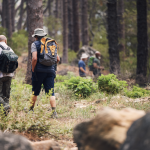Stuart Torrance has spent more than 15 years working with lonely men. The Men’s Health Project Officer at the Australian Men’s Shed Association has seen blokes from all walks of life experience, but also often overcome, loneliness.
One man’s story highlights just how important human connection is.
“We had one participant called Reg, who had a form of dementia,” Torrance says. “Often, Reg got up in the morning, sat at one end of the lounge, and went to sleep again; he wouldn’t communicate, he wouldn’t do anything. And the carer that his wife would bring in to look after Reg would sometimes sleep at one end of the lounge and Reg would be asleep on the other. That’s loneliness — you’re in the company of somebody, but there’s no engagement.
“But (after visiting a Men’s Shed), Reg said ‘when I go to the shed, men welcome me — they say ‘g’day Reg’ and that means the world to me’.”
– Stuart Torrance, Men’s Health Project Officer at the Australian Men’s Shed Association
Reg is just one of the thousands of men the Australian Men’s Shed Association has helped since it was founded in 2007 to prevent loneliness and social isolation amongst older Australian males.
Older males certainly aren’t the only section of Australian society experiencing loneliness.
Our ‘What’s in the Way?’ survey — sampling 1,282 Australian men aged over 18 — found high levels of loneliness in 15.8% of respondents (i.e., more than one in six Australian men).
One in four men aged 35-49 had a high level of loneliness, as did almost one in five men aged 18-34, one in eight men aged 50-64 and one in 16 older men.
These results are consistent with previous Australian and international studies.
The Household Income and Labour Dynamics in Australia (HILDA) survey, which includes over 17,000 people, shows levels of loneliness are highest among those who live alone or are single parents, people born in non-English speaking countries, unemployed people, persons living in areas of most socioeconomic disadvantage, and those with long-term health conditions.
Whether it be nurturing your closest relationships, or looking to form new connections, there are ways for you to prevent, or overcome, loneliness.
Don’t be afraid to take baby steps
If you’re lonely, then seemingly innocuous interactions can help, says Dr Michelle Lim, Chairperson and Scientific Chair of Ending Loneliness Together.
“Different kinds of interactions with different kinds of people can add to people’s well-being,” she says.
– Dr Michelle Lim
“Previously (before the COVID-19 pandemic), the organic little chats that you might have with the person who makes your coffee didn’t seem all that important. But during lockdowns, for example, they became critical.
“Those minute social interactions actually do add up.”
Headspace National Clinical Advisor Rupert Saunders says the first step is to acknowledge the issue, and then try to find solutions.
“It can be difficult to acknowledge you are feeling lonely and you need support,”. “Knowing when to reach out for help is an important first step.
– Rupert Saunders, Headspace National Clinical Advisor
“Building healthy relationships and connections is an important step towards feeling less lonely … staying connected with other people can boost energy, improve one’s sense of belonging, and help people feel supported.
“Building connections can be challenging. It’s important to start small.”
New fathers often experience loneliness, according to Adam Tardif, National Program Leader at Dads Group.
“Many dads experience loneliness, particularly in the first year after their baby has been born,” he says.
“(My advice would be to) get connected with other dads as early as possible, especially in your area. This can be done either by attending new parents’ group sessions or joining a local dads’ group … there are also digital dads’ groups. Or if you’re bold enough, next time you’re at the park and you see another dad, go up and have a chat.”
– Adam Tardif, National Program Leader at Dads Group
What is ‘social fitness’ and how can you improve it?
Lim states that after first acknowledging you may have a problem, a good idea is to build on what she describes as your ‘social fitness’.
“When someone starts to feel lonely, (a good first step would be to) reflect, understand that loneliness is normal but also understand that not everything will work for you,”
– Dr Michelle Lim
“Take little steps. People who are lonely tend to have low social confidence, sometimes social anxiety.
Don’t assume you have to make a new best friend to feel less lonely, but having small conversations, saying ‘hi’ and smiling at someone, small talk, these kinds of things can allow you to gain more confidence.
Then you can start to change strangers into acquaintances, acquaintances into friends, friends into meaningful relationships.
“No one can go from walking around the block to running a marathon — your body will fail. It’s really similar to your mind; everyone’s (physical) fitness is different and everyone’s social fitness is different.”
So the good news is, there are many ways to battle this critical issue. It might be worth checking out the Ending Loneliness Directory, which is a national database of 1,000+ organisations, groups and services that provide opportunities for connection and support.
As with any health condition, speaking to your GP or a medical expert is also a good option if needed.















